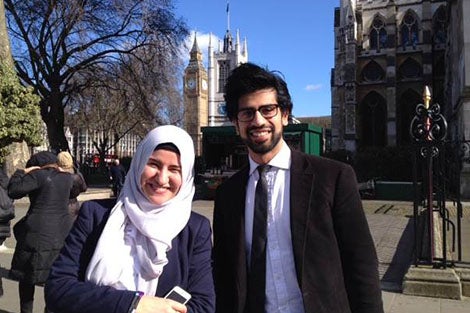May 14, 2015 — It’s not every day that young doctors with ideas about how to change national health policies get a face-to-face meeting with a high-level government official.
But that’s what happened for Nawaz Ahmad and Aslı Kalın, two doctors from the United Kingdom who spent the past year studying health policy and management—both in the classroom and in the field—at Harvard T.H. Chan School of Public Health. Both Nawaz, a Kennedy Scholar, and Aslı, a Frank Knox fellow, will graduate from the MPH program in May 2015.
In late February the two flew to London to meet with the UK’s Minister of Life Sciences and member of Parliament, George Freeman. The meeting came about because of work Aslı and Nawaz conducted during their practicum with UKTI (United Kingdom Trade & Investment), the British government department that supports US companies to invest in the UK. Nawaz and Aslı were based in the British Consulate in Boston, where UKTI’s Life Sciences department works to build cross-border collaborations between the UK and Boston’s biotech community, one of the largest biotech hubs in the world. While there they researched obstacles faced by international companies trying to bring new health-related products or technologies to the UK.
Aslı said that exploring health systems and policy issues in their Harvard Chan classes, along with their previous work in the UK, made them well-suited for the work at UKTI. Aslı has worked for the National Health Service (NHS) and also won an NHS award for developing a smartphone app for hospital doctors. And Nawaz worked on national health policy with the NHS’s medical director.
Uncovering the obstacles
At UKTI, the two looked at how the UK health care system can better adopt innovative technologies. This included interviewing executives of U.S.-based companies to tease out the barriers they face in bringing innovation to the UK and “mapping” the route these innovations take before reaching a patient.
“The idea was to combine what industries have experienced with our knowledge of the processes in the UK to understand where the common ‘pinch points’ in innovation adoption are and how they can be solved,” said Nawaz. They discovered that the ‘pinch points’ faced by these companies could range from the very basic—such as not understanding the landscape of the NHS and the different agencies involved in bringing innovation to the market—to the complex, such as resistance to new technologies that might change entrenched ways of doing things.
Said Aslı, “Even if a health innovation could potentially save the NHS a lot of money, if it requires people to change the way they work it’s just really difficult.” But adopting innovations is a priority for the NHS, Nawaz said—not just because it can improve outcomes for NHS patients, but also because in the future “the NHS will have to do more with less and innovation will be central to achieving this.”
Nawaz and Aslı developed a number of policy recommendations, and UKTI was so impressed with their work that it flew them to London to present their findings to Freeman. “We both wanted to contribute something meaningful with this piece of work,” Aslı said, “but to influence the person with the power to change policy in this area was an opportunity I wasn’t expecting.”
Career plans
After graduation, Aslı will complete her medical residency in the UK, and Nawaz will begin work in the Boston office of the consulting firm McKinsey & Co. Both called their experience at UKTI eye-opening. “It complemented our classroom learning perfectly,” said Nawaz. “We learned firsthand how the right policy levers can enable innovation to transform health systems and improve patient outcomes.” Added Aslı, “This practicum has given me great insight into how crucial the relationship between industry and government is in creating a pro-innovation health system.”
Both Nawaz and Aslı highlighted the benefits of connections formed at Harvard. Their academic adviser, Atul Gawande, professor of health policy and management at Harvard Chan and director of Ariadne Labs, helped connect them to Anne Avidon, UKTI’s head of global health innovation. “His interest in our career interests helped create this opportunity,” Aslı said.
Nawaz and Aslı hope that British doctors who study at Harvard Chan in the future will have the same opportunity to work at UKTI, and are working with the School and the consulate to establish an ongoing practicum there. “It’s a good fit,” said Nawaz. “Smart British doctors interested in health policy come here every year—and UTKI Boston has lots of interesting work and great mentorship.”
— photo courtesy Asli Kalin
